Exponent Properties
Exponent Properties
Generating Equations
System of Equations
Factoring Expressions
Graphing Quadratics
x6x12
x18
What is the equation for a linear function?
What is the equation for an exponential function?
Linear: y = mx + b
Exponential: y=abx
What does the solution to a system of equations look like?
Both an x and a y
"A solution system of equations is a point of intersection"
What "tools" do we use to factor standard form quadratic expressions
y = ax2 + bx + c
Generic Rectangle and Diamond
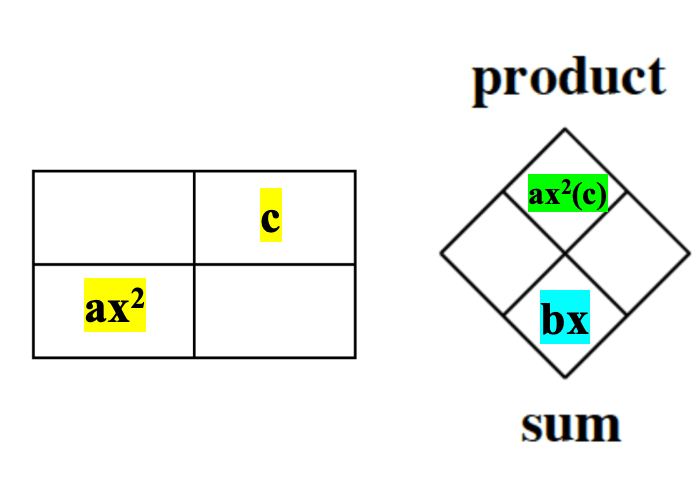
Where in a standard form quadratic equation is the y-intercept located?
y = ax2 + bx + c
y = ax2 + bx + c
The c value!
x^3 / x^5
1/x^2
A line passes through point (12, 32). What information does this give you?
Graph is a line, so equation is y = mx+b
Point gives an x and y value:
x = 12 and y = 32
What method would you use to solve the following system of equations? How do you know?
5x + 12y = 9
7x - 12y = 13
Elimination Method because there are opposites
Find the Area as a Sum and Area as a Product for the following generic rectangle:
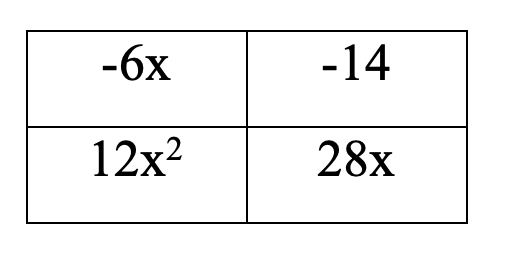
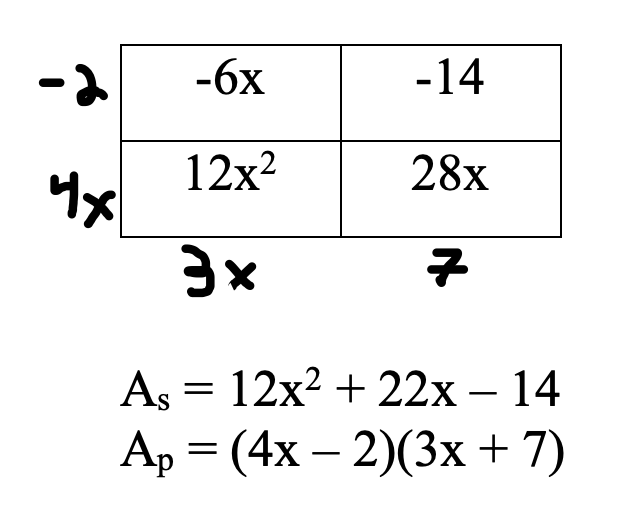
The factored form of a quadratic equation is
y = (x + 7) (3x - 9)
What are the x - intercepts?
x = -7
x = 3
Set factors equal to zero and solve for x
16x10
What is the multiplier for the table below:

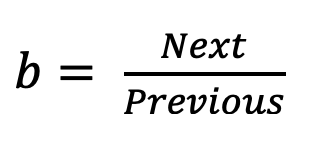
b = 128/32 = 4
Which method would you choose to solve the following system of equations? Explain why.
6x + 2y = 12
4x + y = 18
Either method can be correct
Substitution: Solve for y then plug in
Elimination: Multiply bottom equation by -2 to make opposites.
Is factoring out a greatest common factor the same as factoring completely?
For example, is 2(x2 + 5x + 6) the completely factored form of 2x2 + 10x + 12?
No, factoring out a greatest common factor is not the same as factoring completely. It is a good first step, but you may have to factor more using a generic rectangle and diamond:
Ex:
2x2 + 10x + 12 = 2(x2 + 5x + 6) = 2(x + 3)(x + 2)
What is the vertex of the following factored form quadratic?
y = (x - 4)(x + 2)
x-value:
(4 + (-2))/2 = 1
y - value: (1 - 4)(1+2) = (-3)(3) = -9
Vertex: (1,-9)
(x^2y^11)/(x^4y^8)
y^3/x^2
A line passes through point (4,7) and has a slope of 2.5. Find the equation of the line.
y = 2.5x - 3
Solve the following system of equations using substitution:
3x + 4y = 6
y = 2x - 4
x = 2 and y= 0
(2,0)
Factor the following completely:
2x2 + 8x + 6
2x2 + 8x + 6 = 2(x2 + 4x + 3) = 2(x + 3)(x + 1)
Ex/ y = (x + 5)2 - 24
"The opposite of the inside, take the outside"
Ex/ y = (x + 5)2 - 24
"Opposite of inside" Inside is 5, opposite is -5
"Take the outside" Outside is -24
Vertex: (-5,-24)
(2ax9)2(3a6x2)3
108a20x24
The table below represents an exponential function of the form y = abx. Copy and complete the table and find a corresponding equation.


Solve the following system of equations using any method:
5x - 3y = 16
2x - 3y = -2
x = 6
y = 4.66
What is special about the following quadratics?
A. 4x2 - 25
B. x2 + 16x + 64
A. 4x2 - 25 is a difference of squares.
B. x2 + 16x + 64 is a perfect square trinomial
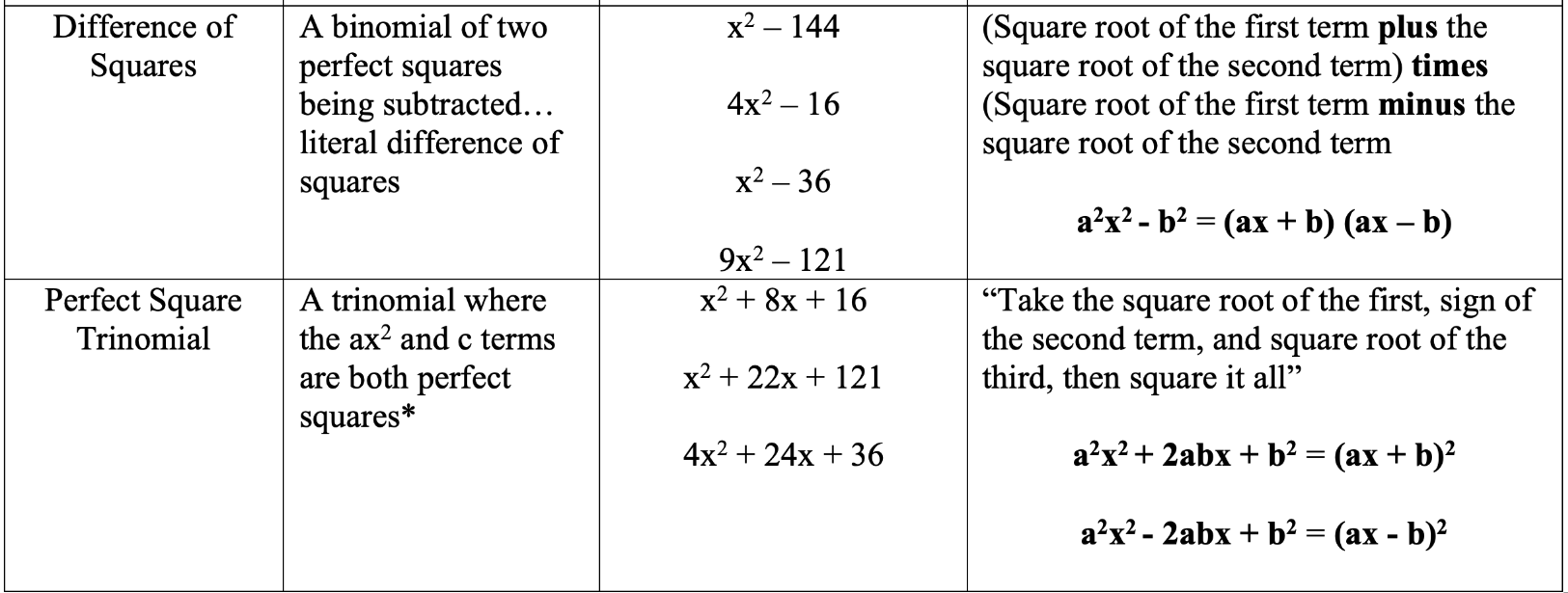
Write an equation to represent the graph below
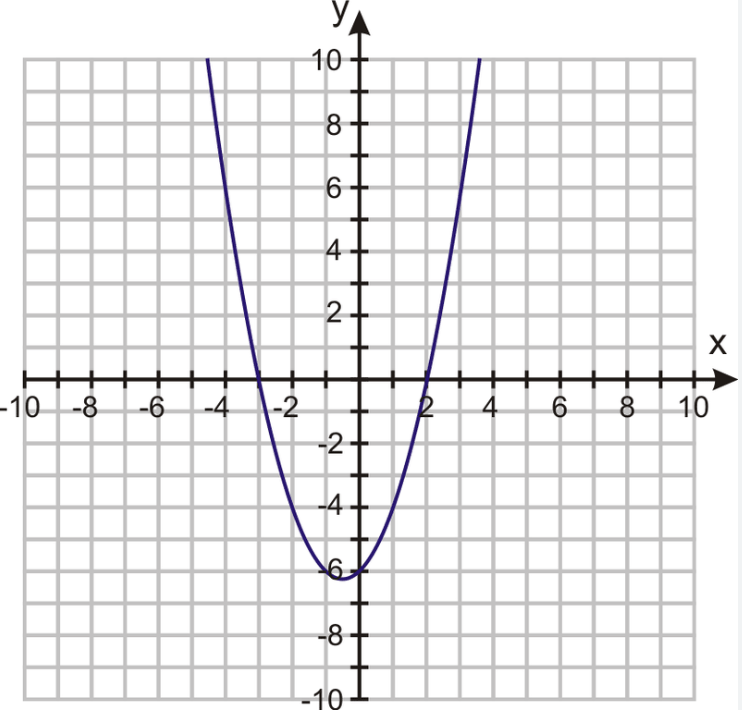
Zeros: x = -3 x = 2
Factored Form: y = (x + 3) (x - 2)
Standard Form: x2 + x - 6